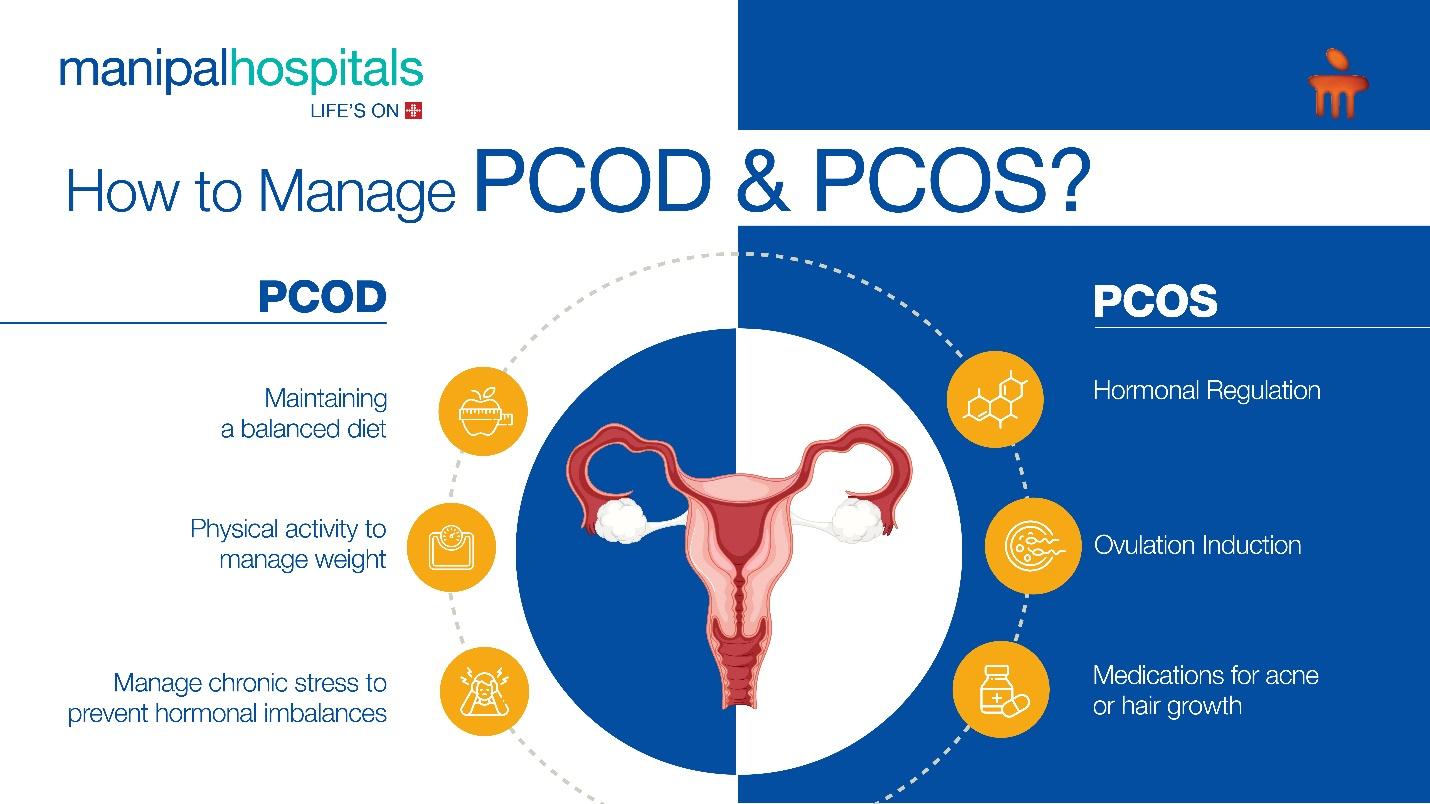
For women navigating the complexities of their reproductive health, terms like PCOD (polycystic ovary disease) and PCOS (polycystic ovary syndrome) can be confusing. However, both conditions share the presence of cysts on the ovaries, but their underlying causes, symptoms, and treatment approaches differ significantly. At Manipal Hospitals Vijayawada, we prioritise patient education, so let's shed light on the distinctions between PCOD and PCOS symptoms and treatments with clear information.
Synopsis
Understanding PCOD or Polycystic Ovarian Disease?
PCOD or polycystic ovary disease is a hormonal disorder. It refers to a condition where ultrasound imaging reveals multiple small follicles, often mistaken for cysts on the ovaries. These follicles may contain immature eggs that haven't fully developed. The prevalence of PCOD or polycystic ovaries syndrome is high and it’s affecting up to 30% of menstruating women.
What is PCOS or Polycystic Ovarian Syndrome?
PCOS which is also known as polycystic ovary syndrome, goes beyond the presence of cysts. It's a complex hormonal disorder characterized by three key features:
-
Polycystic Ovaries: Similar to polycystic ovary syndrome symptoms, women with PCOS have multiple small follicles on their ovaries.
-
Irregular Periods: A hallmark symptom of PCOS is irregular or infrequent periods.
-
Androgen Excess: PCOS is associated with elevated levels of androgens. This hormonal imbalance disrupts the normal menstrual cycle and can lead to other symptoms.

Common Symptoms of PCOD and PCOS?
While PCOD and PCOS have distinct underlying causes, they can manifest through some overlapping symptoms, including:
-
Irregular Menstruation: Both conditions can cause irregular periods, including infrequent cycles, prolonged bleeding, or missed periods entirely.
-
Hirsutism: Excessive hair growth in areas, such as the face, chest, and abdomen. It's a common symptom in both PCOD and PCOS, and its severity can vary.
-
Acne: Androgen excess can contribute to acne breakouts on the face, back, and chest. Both PCOD and PCOS can exacerbate acne.
-
Weight Issues: Weight gain and difficulty losing weight are common concerns for women with both conditions. This can be due to hormonal influences on metabolism and insulin sensitivity.
What are the Key Differences Between PCOD and PCOS?
While some symptoms overlap, crucial differences set PCOD and PCOS apart. Here's a breakdown to have a closer look:
-
Severity: Though PCOD and PCOS symptoms are related conditions that affect women's ovaries, they have distinct differences, such as PCOS is a more complex and severe condition compared to PCOD.
-
Hormonal Imbalance: PCOD may not necessarily involve significant hormonal imbalances, while PCOS is characterised by a clear disruption in hormone levels.
-
Ovulation: Women with PCOD may still ovulate regularly, while ovulation can be infrequent or absent in PCOS, leading to fertility concerns.
-
Fertility: PCOD doesn’t impact on the fertility. Women with POCD still can ovulate and conceive with the help of medication. PCOS affects the fertility in women and therefore, women cannot ovulate.
-
Long-Term Health Risks: PCOS can increase the risk of developing health problems like type 2 diabetes, heart disease, and endometrial cancer. While these risks may be slightly elevated with PCOD, proper management plays a crucial role.
What are the Treatment Options available?
PCOS symptoms and treatment approaches for both conditions differ based on the specific condition. Here's detail below to understand it better:
PCOD Management
In some cases, PCOD may not require specific treatment. However, lifestyle modifications can be highly beneficial to cure PCOD problems, such as:
-
Healthy Diet: Maintaining a balanced diet can help regulate hormones and manage weight, such as whole foods, fruits, vegetables, and lean.
-
Regular Exercise: Physical activity promotes weight management, improves insulin sensitivity, and offers overall health benefits.
-
Stress Management: Chronic stress contributes to hormonal imbalances with lots of other complications. Therefore, it is recommended to practice mindful techniques, such as yoga, meditation, and deep breathing can help manage stress.
PCOS Treatment
A multi-pronged approach is often necessary for PCOS management:
-
Hormonal Regulation: Medications like birth control pills or anti-androgen drugs can help regulate hormone levels and address symptoms like irregular periods and acne.
-
Ovulation Induction: If you're trying to conceive, medications or fertility treatments can help stimulate ovulation.
-
Symptom Management: Medications or cosmetic procedures may be used to address specific symptoms like unwanted hair growth or acne.
While PCOS and PCOD, both are ovarian issues, they differ in terms of scope and clinical implications. Therefore, it’s important to understand the differences between PCOD and PCOS to manage the condition effectively. It’s also crucial to uncover the symptoms and causes for an early diagnosis and personalised treatments. If you suspect having one of these conditions, don’t hesitate to consult a healthcare professional. At Manipal Hospitals Vijayawada, our team of experts is dedicated to empowering women with knowledge and providing comprehensive care for PCOD and PCOS.
FAQ's
The exact cause that develops the condition is unknown. However, it's likely a combination of genetic factors and insulin resistance.
No, there's no cure, but it can be managed effectively with lifestyle changes like maintaining a healthy weight, diet, and exercise routine. Medications can also help regulate hormones and manage symptoms.
PCOS can make ovulation irregular, impacting fertility. However, many women with PCOS can still get pregnant. There are fertility treatments available to help with conception.
Unmanaged PCOD/PCOS can increase the risk of:
- Type 2 diabetes
- Heart disease
- Sleep apnea
- Endometrial cancer



















 3 Min Read
3 Min Read





.png)





